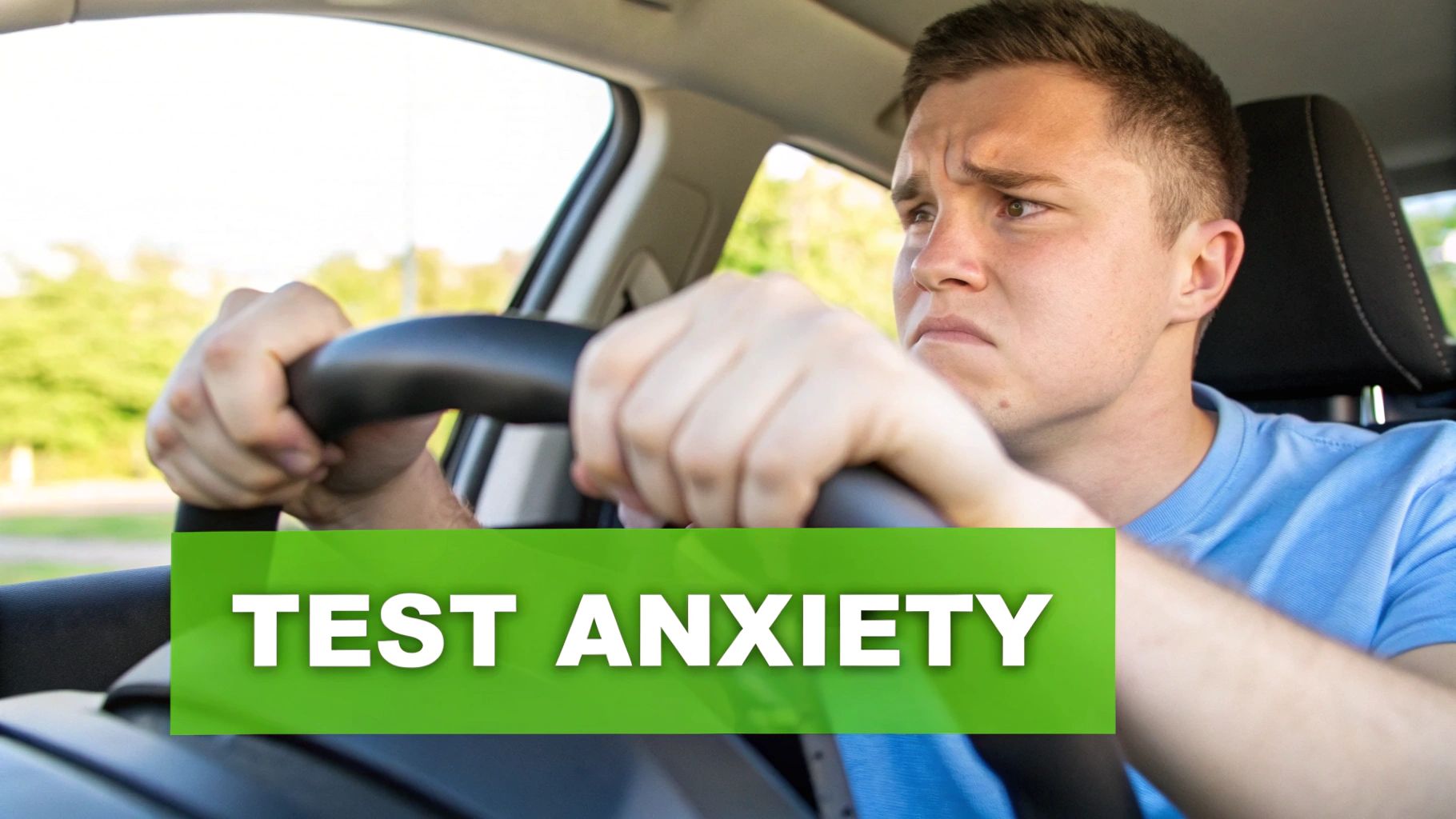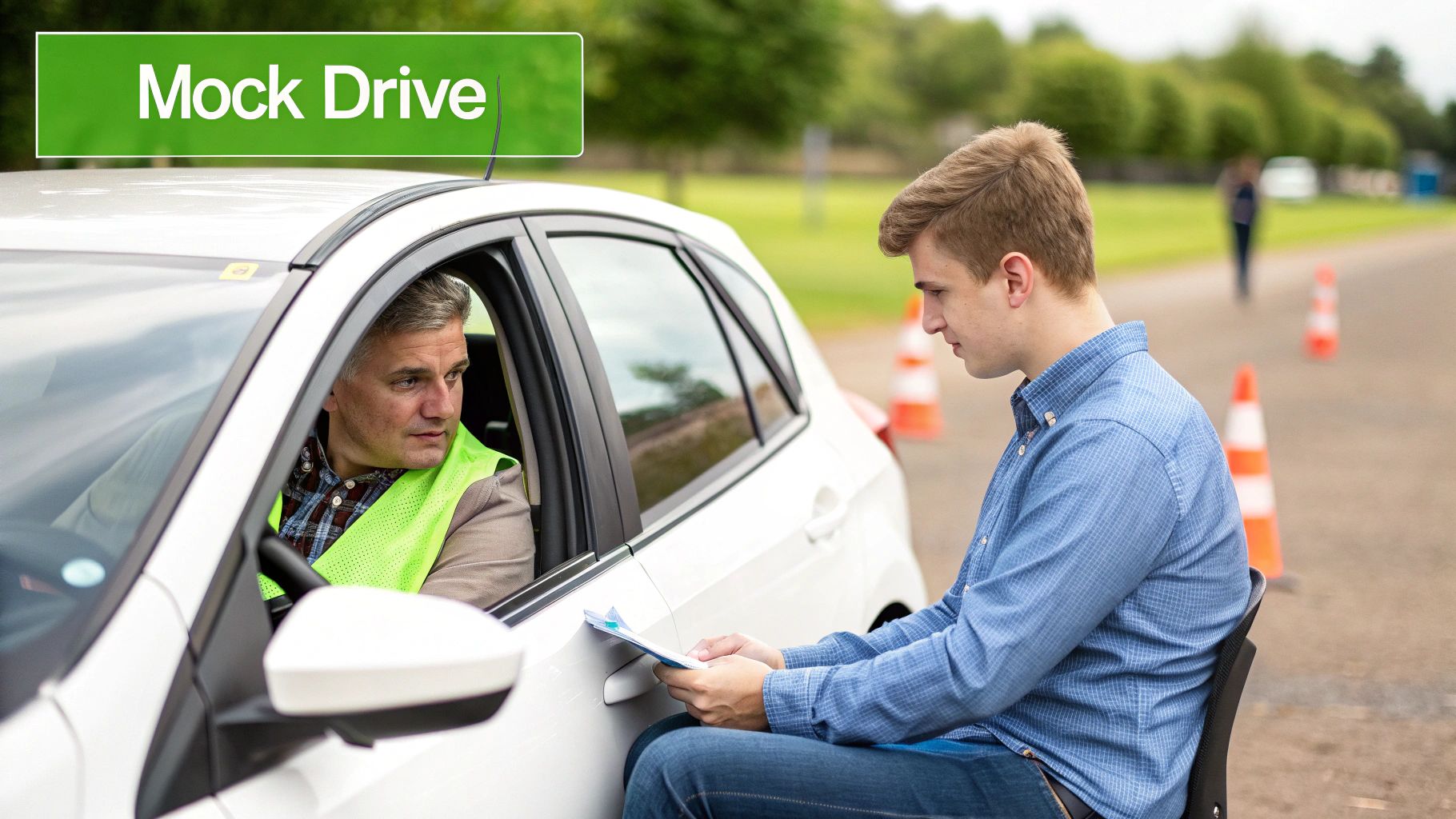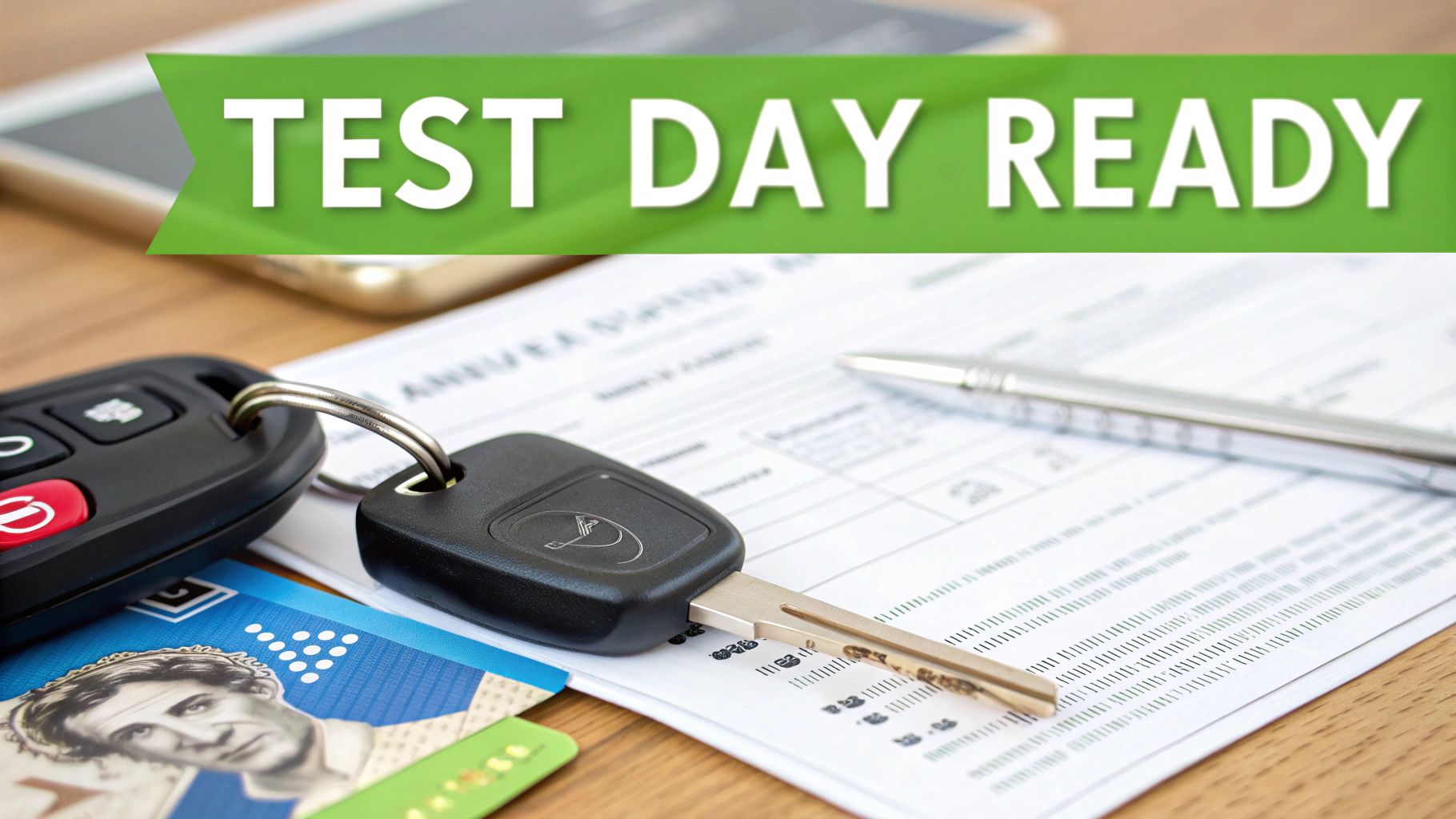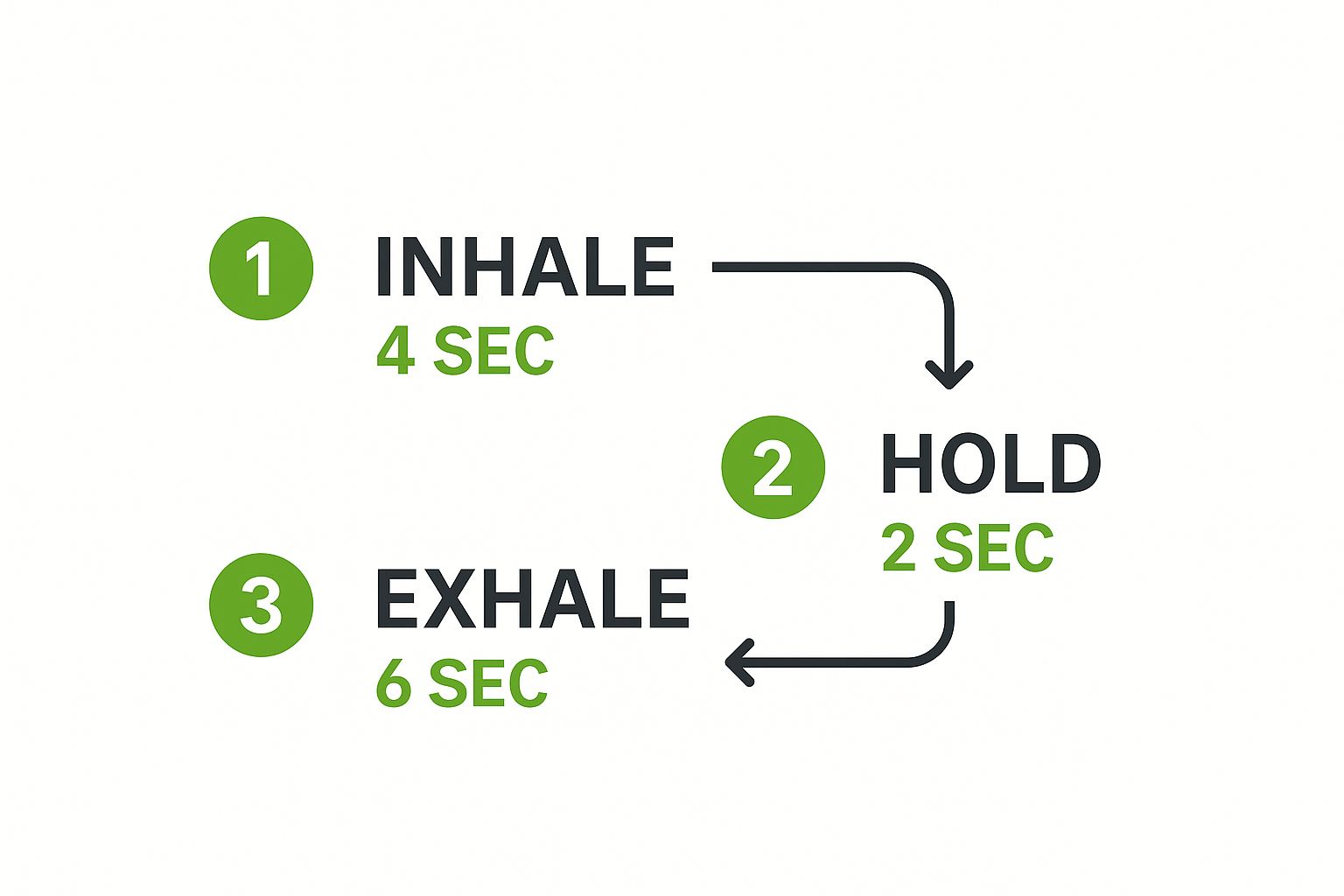Let’s be honest: feeling a bundle of nerves before your driving test is completely normal. In fact, it would be strange if you didn't feel that way. It's a rite of passage for almost every learner driver.
The important thing to remember is that those butterflies in your stomach aren't a sign that you're not ready. It just means you care about the outcome. The trick is learning how to channel that nervous energy into focus.
Why Driving Test Nerves Are Completely Normal

If you’re feeling anxious, you're in very good company. The practical driving test is a unique, high-pressure situation. It’s not just about your driving skills; it’s about performing those skills flawlessly while someone in a high-vis jacket makes notes beside you. Few people feel completely calm under that kind of spotlight.
For most learners I've worked with, the anxiety boils down to the fear of making one silly mistake. That one missed mirror check or a slightly misjudged gap can feel like the end of the world when an examiner is watching your every move.
The Added Pressure of Test Day Delays
Right now, that pressure is even more intense. The UK is grappling with a huge backlog, with around 583,189 driving tests in the queue at the start of the year. When you know it could take months to get another slot, the stakes feel incredibly high. You can find out more about how these waiting times are affecting learner drivers.
This long, drawn-out wait can slowly chip away at your confidence. The test stops feeling like just another drive and transforms into this massive, all-or-nothing event in your mind.
Your nerves are not a weakness; they are a sign that you care about the outcome. The trick is to channel that energy into sharp focus rather than letting it become a distraction.
Understanding that your feelings are a perfectly valid response to a stressful situation is the first step. You're not being dramatic. By pinpointing the roots of your anxiety—from the examiner's presence to the national backlog—you can start to shift your mindset. It’s about moving from "What if I fail?" to "I am prepared for this."
Build Your Mental Resilience Before Test Day
True confidence begins in your mind, long before you even arrive at the test centre. If you're grappling with nerves, remember that building mental resilience is just as crucial as perfecting your parallel park. Think of this as your personal toolkit for turning that anxious energy into calm, focused concentration.
One of the most powerful tools I’ve seen work time and again is visualisation. Take a few quiet minutes each day, close your eyes, and mentally walk through different parts of the test. Don't just see yourself succeeding; actually feel it. Imagine the sensation of a smooth gear change, the confident glance in your mirror, or nailing a tricky manoeuvre like exiting a busy roundabout. This isn't just wishful thinking; it's mental practice that builds muscle memory, making the real situation feel far more familiar and less daunting.
Master Your Inner Dialogue
That little voice inside your head can be your worst critic or your staunchest supporter. The choice is yours. When you catch yourself thinking, "I'm definitely going to mess this up," you need a plan to challenge it.
Positive self-talk isn’t about pretending you're not scared. It's about looking that fear in the eye and choosing a more powerful, reassuring thought instead.
Start by replacing self-doubt with direct, affirming statements. Create a few simple mantras you can repeat to yourself before a lesson or even during the test itself. These small but consistent shifts in your internal script can make a world of difference to your mindset.
Here’s how to reframe those common worries:
- Instead of: "What if I stall at that big junction?"
- Try: "I've practised my clutch control countless times. I know exactly how to handle junctions safely."
- Instead of: "The examiner is going to think I’m a terrible driver."
- Try: "I am prepared and focused. My job is to demonstrate that I am a safe and competent driver."
If you find that anxiety is a persistent barrier, our guide on driving lessons for anxious drivers offers more specialised strategies that might help.
Some people also explore natural supplements to help manage stress. For instance, you could read up on using Ashwagandha for stress relief to see if it’s an option that might support your journey.
Finally, don’t forget to breathe. It sounds simple, but it’s incredibly effective. When nerves spike, your breathing often becomes shallow and quick. You can discreetly use the 4-2-6 breathing technique anytime you feel overwhelmed—even while waiting for the examiner's next instruction. Simply breathe in slowly for a count of four, hold it for two, and then exhale gently for six. This simple physiological trick can slow your heart rate and bring a sense of calm when you need it most.
Turn Your Practice Into Unshakeable Confidence

Let's be honest, the best way to quiet those pre-test jitters is to know, deep down, that you're genuinely ready. True confidence isn't something you can just conjure up; it's earned through consistent, deliberate practice. When you’ve already faced the trickiest driving situations head-on, there's simply less room for anxiety to creep in.
A key part of building that solid self-belief is taking a mock driving test. This is more than just another lesson—it’s the full dress rehearsal. Ask your instructor to go into full examiner mode: silent, giving only directions, and marking you based on the official DVSA criteria. Getting used to that formal, quiet atmosphere means the real thing won't feel like such a shock to the system.
Master Your Environment
A lot of driving test anxiety comes from a fear of the unknown. So, the best way to tackle it is to make the unknown familiar. Stop sticking to the simple, comfortable routes you already know like the back of your hand. Instead, actively seek out the roundabouts, junctions, and roads that still give you a flicker of doubt.
"True confidence comes from repeatedly proving to yourself that you can handle challenging situations. Strategic over-preparation is your best defence against anxiety."
Work with your instructor to figure out the likely test routes from your local centre. Then, make a point of driving them at different times. A roundabout that’s a breeze at 10 AM can be a completely different beast during the 4 PM school run rush. This kind of varied practice builds the real-world skills you need to handle whatever the road throws at you.
Automate the Basics to Reduce Stress
Finally, don't let the easy marks slip away. The 'Show Me, Tell Me' questions are a fantastic opportunity to start your test on a positive, confident footing. It’s surprising how many learners stumble over these, but they are incredibly easy to lock down with a bit of practice.
The goal is to make your answers completely automatic. Here’s how:
- In the car: Get your instructor to fire questions at you randomly during your lessons.
- At home: Run through the answers while you're waiting for the kettle to boil or just before you drift off to sleep.
- With others: Ask a friend or family member to quiz you, making sure they mix up the order.
When you can answer the 'Show Me, Tell Me' questions without even thinking, you've removed a major source of stress. This frees up your mental bandwidth, allowing you to focus 100% on what really matters: your driving.
Your Game Plan for a Calm and Focused Test Day

How you manage the 24 hours before your test can make or break your performance. Believe me, a solid plan is your secret weapon. It cuts down on those last-minute surprises, helps keep the stress at bay, and lets you walk into that test centre feeling composed and in control, not flustered and frantic. This isn't just about avoiding a meltdown; it's about actively setting yourself up for success.
The night before your test is absolutely crucial. You need to prioritise a proper night's sleep to make sure you're mentally sharp. That means winding down early—step away from the theory test app and do something genuinely relaxing instead.
One of the best things you can do is get all your documents ready the night before. It’s a simple action, but it completely removes that heart-pounding panic of searching for your licence on the morning of the test.
Pre-Test Checklist:
- Your UK provisional driving licence.
- Your theory test pass certificate (if you have it).
- A car that's properly taxed, insured, and has a valid MOT.
- L-plates correctly displayed on the vehicle.
Getting this sorted means there's one less thing to worry about, allowing you to focus purely on the drive ahead.
Your Test Day Morning Routine
On the morning of the big day, think carefully about what you eat. A sugary cereal or an extra shot of espresso might seem like a good idea, but the inevitable energy crash or heightened anxiety just isn't worth it. Go for a balanced breakfast like porridge, eggs, or even a banana to give you that slow-release energy you'll need.
I always recommend booking a final one-hour warm-up lesson with your instructor right before the test. This isn't the time to be learning brand new manoeuvres. Instead, it’s a chance to get "in the zone," run through a parallel park or a bay park, and shake off any final nerves. Arriving at the test centre feeling comfortable behind the wheel is a massive confidence booster.
This calm, prepared mindset is more important than you might realise. In March alone, 162,259 driving tests were conducted in the UK, with the pass rate climbing to 49.0% from the previous year. This could suggest that learners who are better prepared and less nervous are the ones passing. You can dig into more official stats in the UK driving test data.
Ultimately, a calm, organised approach can be the deciding factor. For even more detailed tips, you might find our guide on how to relax before a driving test really helpful.
How to Manage Your Nerves During the Actual Test
Alright, the moment of truth. You’re in the car, the examiner is next to you, and the test has begun. If you feel that all-too-familiar flutter of anxiety, don't panic. The real test isn't about driving with flawless perfection—it's about showing you can handle the road safely, even if you make a small slip-up.
So, what happens if you stall the car or make a slightly clumsy gear change? Nothing, if you handle it correctly. The key is not to let a minor hiccup throw you off your game for the next 10 minutes. Acknowledge it, take a single deep breath, and immediately refocus on what's ahead. The examiner is looking for a driver who can recover calmly, not a robot. Dwelling on one tiny error is the fastest way to make another.
Staying Grounded Under Pressure
One of the best ways to stay in the moment is to listen intently to your examiner. It’s completely fine to ask them to repeat something. Saying, "I'm sorry, I didn't quite catch that, could you say it again?" shows you're engaged and careful. It's far better than panicking, guessing, and turning down the wrong road.
Another great trick is to talk yourself through your manoeuvres—not out loud, but in your head. As you approach a roundabout, run through the routine: 'Mirrors, signal, position, speed, look.' This internal checklist keeps your brain busy with the task at hand, leaving no room for those "what if I fail?" thoughts to creep in. It’s a simple but incredibly effective technique for staying focused.
If you’re looking for more ways to get a handle on your nerves, our guide on how to overcome driving anxiety has some fantastic, in-depth advice.
Take a look at this simple breathing exercise. You can do it discreetly anytime you feel the pressure building, even while you’re waiting at a traffic light.

This 4-2-6 breathing method is a proven way to slow your heart rate and bring a sense of calm back to your body and mind. Just breathe in for four seconds, hold for two, and breathe out slowly for six. Give it a try.
It's completely normal for specific worries to bubble up, even when you feel you've prepared for everything. Let's walk through some of the most common questions and fears that learners have about the driving test. Getting some straight, practical answers can make a world of difference.
Is It Okay to Tell the Examiner I'm Nervous?
Yes, absolutely. In fact, I often recommend it. Examiners are people too, and they see nervous learners day in and day out. They understand the pressure cooker you're in.
A simple, "Just to let you know, I'm feeling a bit nervous today" can do wonders. It breaks the ice and shows a bit of self-awareness. While they can't change the test criteria for you, letting them know means they're less likely to mistake a shaky hand for a fundamental lack of control. They're there to assess if you're safe, not how cool and calm you are. You won't be marked down for being human.
Don't be afraid to show you're human. Acknowledging your nerves to the examiner can break the ice and shows you're self-aware, which is a sign of maturity. They expect you to be nervous.
What If I Make a Mistake Right at the Start?
This is probably one of the biggest fears out there, but it's crucial not to let it derail you. Making a minor slip-up in the first few minutes, like stalling or a slightly jerky gear change, is not an automatic fail. Far from it. Examiners are looking at your overall driving ability throughout the whole test, not one single moment.
What really matters is how you handle it. If you stall, just take a breath, restart the engine safely, and carry on. If you take a wrong turn during the independent driving section, don't panic—just follow the new route safely. A calm and controlled recovery actually looks great to an examiner. It shows you're resilient, a vital trait for any driver. One little error doesn't define your entire performance.
What Should I Eat or Drink on Test Day?
What you fuel your body with on test day really can have an impact. It’s tempting to down a strong coffee or a sugary energy drink for a boost, but the caffeine overload can actually make your anxiety worse, giving you the jitters and a racing heart. It’s also a good idea to steer clear of a big, greasy breakfast that could leave you feeling sleepy and sluggish.
The trick is to aim for something light but sustaining. Think along these lines:
- Porridge or whole-grain toast: These provide slow-release energy to keep you focused.
- A banana: Easy on the stomach and a good source of energy.
- A simple yoghurt.
Drink water to stay hydrated, but don't go overboard right before you head out, for obvious reasons! You want to feel physically comfortable and balanced, not wired or bloated.
Ready to turn that nervous energy into driving confidence? At Fast Pass Driving Courses, we offer structured, intensive courses with DVSA-approved instructors to get you test-ready, fast. Book your course today and let us help you get on the road to success.

